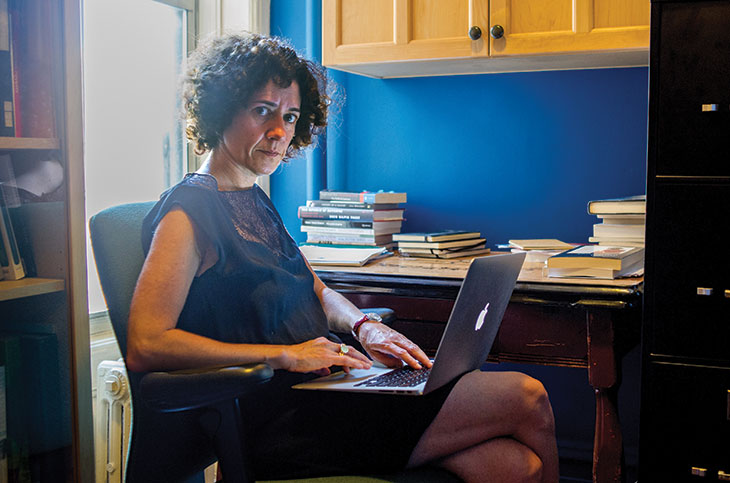Julie Livingston

2013 Recipient of MacArthur Fellowship
“It was a long and bizarre path,” says Julie Livingston ’84, a professor at Rutgers University. She’s describing how, after dropping in and out of college and graduate school for 17 years, she became a public-health historian and anthropologist, published two books on caregiving and medicine in Botswana, and was named a 2013 MacArthur Fellow—one of just 24 people to receive a “no-strings-attached,” five-year, $625,000 grant from the John D. and Catherine T. MacArthur Foundation.
“You get a surprise phone call one day,” Livingston says with a laugh about receiving the news of her fellowship. “It’s like Ed McMahon shows up with a cardboard check, only you didn’t even fill out the Publishers Clearing House form.”
The grants, for which there are no applications or unsolicited nominations, are given annually to “talented individuals who have shown extraordinary originality and dedication to their creative pursuits and a marked capacity for self-direction,” according to the MacArthur Foundation. Livingston’s grant is in recognition of her research in Botswana, where she observed and documented how people with chronic illnesses, particularly cancer, are cared for and treated.
Livingston’s own experience as an adolescent patient prompted her interest in health, she says, “not from the perspective of someone who wants to become a doctor but from the perspective of someone who’s trying to make sense of,‘What just happened to me?’ “
Battling such questions interrupted her focus on her education, and she worked as a waitress, baker and line cook while at Tufts University (where she earned her B.A.), Boston University (M.A. and M.P.H.) and Emory University (Ph.D.). She once considered becoming a baker rather than a scholar, reflecting, “I made doughnuts, pies and cakes in the morning and waited tables at night. It was creative, and the things you were making made people happy.”
Undergraduate courses in African history, however, spurred an interest. Livingston hitchhiked across Zimbabwe and Botswana and subsequently attended a summer institute on public health in developing countries. She later returned to Botswana for dissertation research.
Her first book, Debility and the Moral Imagination in Botswana (2005), sheds light on how people have historically cared for one another in their homes and how these practices have evolved with political and economic developments, as well as with modern medical treatments.
“I was interested not in the category of the disease but in the experience of being sick, ” Livingston explains. She witnessed the challenges of people with limited resources caring for family members, and “I started to realize that the way I experience pain is a cultural artifact that has assumptions about the ability of the health system to palliate. I came to learn that’s not an expectation everyone is able to hold.”
When Livingston later returned to Botswana, she became intrigued by the country’s first—and only—dedicated oncology ward, and she decided to focus her ethnographic work on how cancer, a growing epidemic in that country, was being treated and the myriad ways it impacted patients, caregivers and society as a whole.
“When I started working in the oncology ward in 2006,‘cancer’ was a novelty in the country,” she says. “There had long been people with cancer in Botswana, but since it was hard to get diagnosed, the word itself hadn’t crystallized in the popular imagination. It wasn’t something people worried about.” By 2010, that had changed.
Livingston’s multiyear research culminated in the 2012 publication of Improvising Medicine: An African Oncology War in an Emerging Cancer Epidemic. In that book’s first chapter, she writes “…I present the ward as both a metaphor for and an instantiation of the constellation of bureaucracy, vulnerability, power, biomedical science, mortality, and hope that shape early-twenty-first century experience in southern Africa. And as, quite simply, a cancer ward—a powerfully embodied social and existential space.”
Livingston is now focusing her attention on the aftermath of suicide and its web of impact in New York, where she currently lives with her daughter.
—Taline Manassian ’92